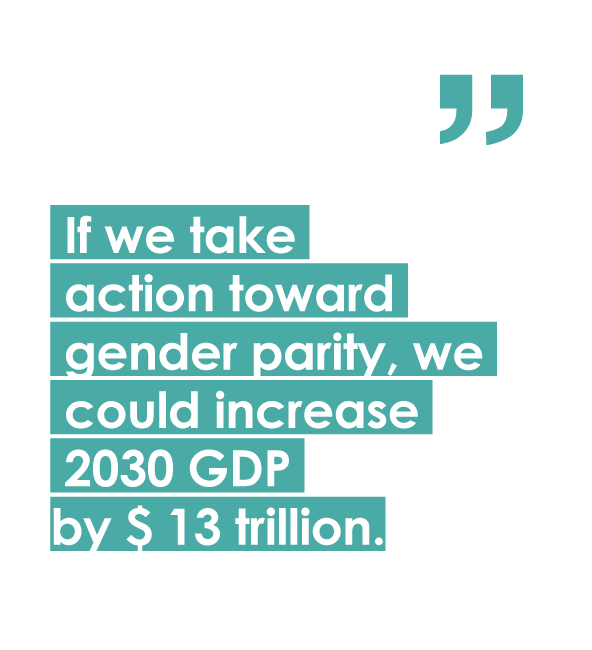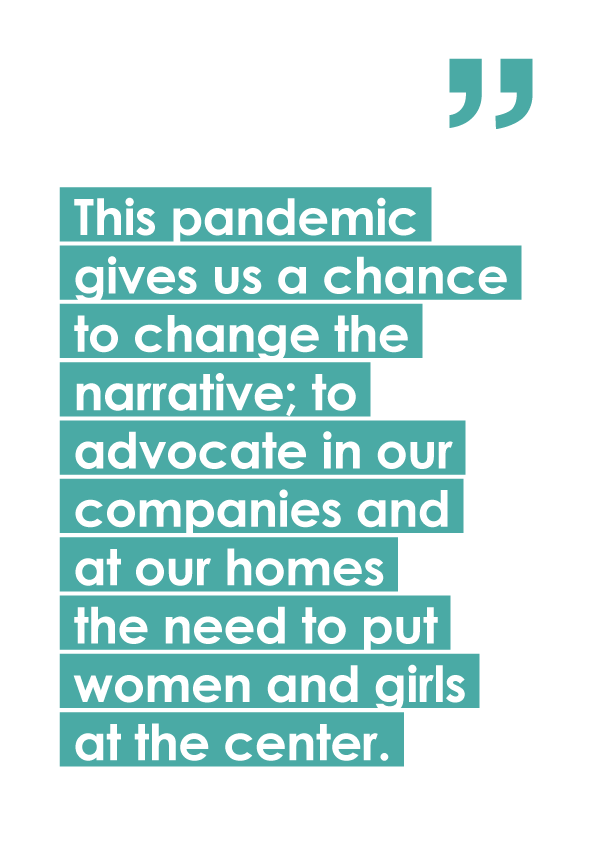The spread of the worldwide COVID-19 pandemic has caught the world off guard. It has created shock and disbelief even in the richest nations of the West that were unprepared to face this deadly disease.
As a result, many companies, both large and small, have not survived the economic impact of COVID-19, throwing millions more families into poverty and causing a major setback to the economic wealth and progress of our society.

Remembering Barack Obama’s words that “progress isn’t always a straight line or a smooth path,” leaders and companies need to move quickly to address the further needs of their employees, and to reshape their business structure and mentality in the wake of COVID-19.
To start, business leaders should focus on how to support their employees. They should reexamine their leadership styles, their talents and diverse skills, increase diversity and close the gap in gender equality.
In the last months, we have discovered how women are the backbone of our society, as they carry out most of the unpaid labor. Their work was fundamental to sustaining us during the first wave of COVID-19. During the lockdown, they have been the ones dealing with kids at home, taking care of the elderly, putting food on the table, and schooling the children. According to the WHO, in the health sector, women comprise over 75% of the workforce. That makes them indispensable contributors to the delivery of health care services.
In whatever society you look at, women carry out two and a half times more work at home than men do. We are also seeing that women’s jobs are 1.8 times more vulnerable in this crisis than men’s jobs, mostly because they are greatly represented in sectors that are expected to decline most due to this pandemic.
On the economic side, supporting women and narrowing the gender gap will be a huge boost of the global GDP. According to a McKinsey study, if we do nothing to narrow this gap, we will lose $1 trillion. However, if we take action toward gender parity, we could increase 2030 GDP by $13 trillion. It would also result in the creation of 230 million new jobs for women globally in the next decade.
The bottom line is that investing in gender parity would drive economic growth. McKinsey research finds that companies with gender diversity on executive teams are 25 percent more likely to have above-average profitability.
According to the PwC’s latest Women in Work Index, Slovakia has only made small improvements over the last 18 years in achieving gender parity. Increasing the female employment rate to match that of Sweden could boost the country’s GDP by 7.8%.

Under these circumstances, we can no longer keep addressing the gender equity only as a topic which is politically correct, or simply because it’s a popular
subject. During his mandate, the former president of Slovak Republic, Andrej Kiska, expressed appreciation toward the women, “because [they] make our [male’s] world more beautiful.”
That’s deceiving; women should not be viewed as a nice accessory to the male dominated world. They are an essential part of the workforce.
This pandemic gives us a chance to change the narrative; to advocate in our companies and at our homes the need to put women and girls at the center. They already are at the center of our lives. We need to embrace a new vision in which women will be empowered to help mitigate the economical and human toll of this pandemic.
The time has come for full gender equality. It is time to rebuild more inclusive, equal and resilient societies, where what is good for achieving gender equity is also essential for our companies, the economy and the society.
________
Our company has always supported women in the workplace by giving equal pay and flexibility to both male and female employees for children’s needs, and supporting women who have specific needs.
Last year, we started an innovative program by providing free feminine sanitary products to our employees.
At the beginning, the first issue we faced was, can we include them into the company’s costs? You would think that feminine products, which are needed by every woman, every month, are treated by law like hand soap or toilet paper.
Believe it or not, the law has never specifically addressed it, as if menstrual products were considered to be luxury items, and not a necessity for women in the work place. To solve this issue we asked a major worldwide tax consultant for advice. They agreed with us that a company can fully tax-deduct the cost of menstrual products.
We live in a society that has not yet recognized the full rights of women, but we can all turn it around. The latest program started by our company helps to empower women with a simple message: We support you, understanding your needs, creating a real culture of respect and inclusion. And my colleagues love it.
Linda, Financial Manager, EXPANDTECH, a.s.
________
Guido A. Longhitano, Managing Director, EXPANDTECH, a.s.



Follow us